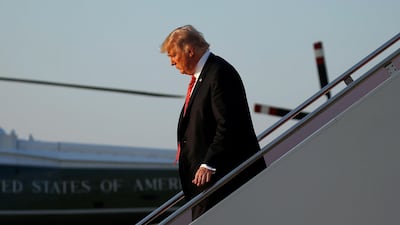Congressional investigators have recovered an email sent last year by senior aide to Donald Trump that describes efforts to arrange a meeting between his campaign officials and Vladimir Putin, according to CNN.
The email from Rick Dearborn, now the president’s chief of staff, was sent to members of the campaign team with information about a contact trying to connect them to the Russian head of state.
The message suggests Mr Dearborn was sceptical of the offer, but its emergence highlights the way the White House has been unable to choke off the drip, drip, drip of details about links between the Trump campaign and Russia.
Although no smoking gun has emerged, the question of who knew what and when about Moscow’s efforts to swing the election for Mr Trump continues to cast a long shadow over his administration.
The issue is being pursued by multiple Congressional committees and by a federal investigation.
Sources told CNN the email was written in June last year at about the time when a Russian lawyer and lobbyist with links to the Kremlin met the president’s eldest son, Donald Trump Jr, his son-in-law Jared Kushner and then-campaign chairman Paul Manafort.
The potential intermediary was identified in the email only as being from “WV”, which was taken as meaning West Virginia. However, no other details of their identity or what they were seeking have been released.
Although the network individuals sucked into the controversy has gone as far up the White House chain as Mr Trump’s family, this is the first time Mr Dearborn’s name has been raised in connection with the investigation.
In 2016, he was chief of staff to Jeff Sessions, then a senator for Alabama, and served as a policy adviser on Mr Trump’s campaign.
Mr Sessions is now attorney general but had to recuse himself from the department of justice investigation into Moscow’s election meddling after it emerged that he gave misleading statements about his contacts with Russian officials.
Intelligence analysts say the newly disclosed email fits a well-established pattern of Russian intelligence operatives – and Soviets before them - casting a wide net and trying to exploit any contacts, at any level, they could make in the hope of a return.
Robert Deitz, former senior counsellor to the director of the Central Intelligence Agency, said it was a tactic used since Soviet times and offered a good chance that a potentially useful source would bite.
“Lower level people can be more valuable. Senior people have to deal with foreign governments and intelligence agencies and so forth so it is easier for them to ignore approaches,” he said.
“For a young professional it can be flattering to be approached and they are often the ones most enchanted when attempts are made.”
Glenn Carle, a career CIA officer who retired as deputy national intelligence officer for transnational threats on the National Intelligence Council, said it was no surprise that details of the Russian operation kept emerging.
“The operations and efforts by the Russians have been so extensive and so vast that it’s impossible to keep stuff secret ultimately,” he said.
Earlier this month it emerged that a volunteer foreign policy adviser to the campaign repeatedly tried to set up meetings with the Russian leadership last year.
In March 2016, George Papadopoulos, an oil and gas consultant, sent an email to seven campaign officials with the subject heading: "Meeting with the Russian Leadership – Including Putin," according to the Washington Post.
American intelligence agencies believe the Kremlin tried to influence the outcome of last year’s presidential election by leaking hacked emails from Democratic Party officials, as part of an effort to turn voters against Hillary Clinton.
They are also investigating whether Russian hackers managed to attack computer systems used to tally votes, although there is no evidence they were able to alter the outcome.

